- Home
- Richard Laymon
Allhallow's Eve: (Richard Laymon Horror Classic)
Allhallow's Eve: (Richard Laymon Horror Classic) Read online
Allhallow’s Eve
Richard Laymon
Copyright © 1985 Richard Laymon
The right of Richard Laymon to be identified as the Author of the Work has been asserted by him in accordance with the Copyright, Designs and Patents Act 1988.
Apart from any use permitted under UK copyright law, this publication may only be reproduced, stored, or transmitted, in any form, or by any means, with prior permission in writing of the publishers or, in the case of reprographic production, in accordance with the terms of licences issued by the Copyright Licensing Agency.
First published as an Ebook by Headline Publishing Group in 2012
All characters in this publication are fictitious and any resemblance to real persons, living or dead, is purely coincidental.
Cover photograph © Nejron Photo/Shutterstock
Cataloguing in Publication Data is available from the British Library
eISBN : 978 0 7553 9159 2
HEADLINE PUBLISHING GROUP
An Hachette UK Company
338 Euston Road
London NW1 3BH
www.headline.co.uk
www.hachette.co.uk
Contents
Title Page
Copyright Page
About the Author
Also by Richard Laymon
Chapter 1
Chapter 2
Chapter 3
Chapter 4
Chapter 5
Chapter 6
Chapter 7
Chapter 8
Chapter 9
Chapter 10
Chapter 11
Chapter 12
Chapter 13
Chapter 14
Chapter 15
Chapter 16
Chapter 17
Chapter 18
Chapter 19
Chapter 20
Chapter 21
Chapter 22
Chapter 23
Chapter 24
Chapter 25
Chapter 26
Chapter 27
Chapter 28
Chapter 29
Chapter 30
Chapter 31
Chapter 32
Chapter 33
Chapter 34
Chapter 35
Chapter 36
Chapter 37
Epilogue
Richard Laymon wrote over thirty novels and seventy short stories. In May 2001, The Travelling Vampire Show won the Bram Stoker Award for Best Horror Novel, a prize for which Laymon had previously been shortlisted with Flesh, Funland, A Good, Secret Place (Best Anthology) and A Writer’s Tale (Best Non-fiction). Laymon’s works include the books of the Beast House Chronicles: The Celler, The Beast House and The Midnight Tour. Some of his recent novels have been Night in the Lonesome October, No Sanctuary and Amara.
A native of Chicago, Laymon attended Willamette University in Salem, Oregon, and too an MA in English Literature from Loyola University, Los Angeles. In 2000, he was elected President of the Horror Writers’ Association. He died in February 2001.
Laymon’s fiction is published in the United Kingdom by Headline, and in the United States by Leisure Books and Cemetery Dance Publications.
Praise for Richard Laymon:
‘This author knows how to sock it to the reader’ The Times
‘A brilliant writer’ Sunday Express
‘No one writes like Laymon and you’re going to have a good time with anything he writes’ Dean Koontz
‘In Laymon’s books, blood doesn’t so much as drip as explode, splatter and coagulate’ Independent
‘Stephen King without a conscience’ Dan Marlowe
‘Incapable of writing a disappointing book’ New York Review of Science Fiction
‘A gut-crunching writer’ Time Out
‘This is an author that does not pull his punches … A gripping, and at times genuinely shocking, read’ SFX Magazine
Also by Richard Laymon and published by Headline
The Beast House Trilogy:
The Cellar
The Beast House
The Midnight Tour
Beware!
Dark Mountain
The Woods are Dark
Out are the Lights
Night Show
Allhallow’s Eve
Flesh
Resurrection Dreams
Alarums
Blood Games
Endless Night
Midnight’s Lair*
Savage
In The Dark
Island
Quake
Body Rides
Bite
Fiends
After Midnight
Among the Missing
Come Out Tonight
The Travelling Vampire Show
Dreadful Tales
Night in the Lonesome October
No Sanctuary
Amara
The Lake
The Glory Bus
Funland
The Stake
*previously published under the pseudonym of Richard Kelly
1
Clara Hayes had lived alone in the last house on Oakhurst Road ever since a heart attack struck her husband at the top of the stairs and he tumbled down to land at her feet. Dr Harris said the broken neck killed him before cardiac arrest got the chance. That was eleven years ago.
He’d been a cranky old bastard, and she was well rid of him.
Alfred was a far better companion than her husband had been, even though Alfred spent most of the day stalking through the cemetery behind the house.
The ten o’clock news came on, so Clara knew it was time for Alfred to come in. She used her remote to turn off the television, then picked up her cane and hobbled out to the kitchen. She opened the back door.
A chilly wind blew against her. She took a deep breath of the fresh October air, and peered across her yard.
‘Al-l-l-fred!’ she called.
Generally, she would hear the clink of his collar tags before ever seeing him. She listened, but heard only the dry shuffling of leaves on the graveyard trees.
‘Al-l-l-fred?’
Careful not to fall – her broken hip last year had laid her up good and proper for five months – she stepped down the three wooden stairs to the yard. She made her way across the moonlit lawn, and stopped at the edge of her flower bed. From there, she peered through the bars of the cemetery fence. So dark over there, the trees shading the moon.
‘Al-l-l-l-fred!’ she called. Much too loudly. She imagined heads rising in their coffins, turning – corpses listening to her voice. Softly, she called, ‘Here, kitty-kitty-kitty.’
Her eyes searched the darkness.
Saw a solitary figure near the cemetery fence.
Gasping, she took a quick step backwards. Her foot slipped on the dewy grass. She jabbed down her cane, and caught her balance.
‘Dear me,’ she muttered.
She looked again at the dark figure – the stone angel of a monument she’d seen thousands of times before, in daylight. The graveyard looked so different at night. She didn’t like it, not one bit. She should’ve stayed in the doorway to call Alfred, the way she always did after dark.
‘You just stay out,’ she muttered, ‘if that’s your drother.’
She turned away from the cemetery, and started her journey back to the open kitchen door. She hurried. The back of her neck tingled with gooseflesh, and she knew it wasn’t the wind’s doing.
I’m just being silly, she thought. That graveyard’s safe as apple pie. I’m just letting my jitters get the best of me.
Never yet been a corpse crawl out of its hole and go chasing after live folks.
It’s not hardly about to start happening tonight.
Fur brushed her leg, and she yelped.
Alfred scampered up the porch steps, stopped abruptly in the doorway, and looked over his shoulder at Clara.
‘You rascal,’ she said,
She took a deep, shaky breath, and pressed a hand to her chest.
‘Scared my wits out,’ she told him.
She started to climb the steps.
That’s when she heard a quiet, muffled clank rather like a crowbar dropping onto a wooden floor. Staring at Alfred, she hardly breathed.
The cat turned away, as if bored. He disappeared into the kitchen. Clara hurried in after him. She swung the kitchen door shut, and locked it.
Alfred sat down in front of the refrigerator. He looked back at Clara.
‘Not just now,’ Clara whispered.
Turning off the kitchen light, she limped into the dining room. She made her way past her highboy. The room was dark, but she saw no use in planting herself smack in front of the window where she just might be seen – so she approached the window from its side.
If she just had one of those cardboard periscopes like Willy used to play with … Well, you couldn’t ever see much with that contraption, anyhow.
Bracing herself on the cane, she leaned toward the window. She eased aside the soft, priscilla curtains and peered out.
The Sherwood house, next door, looked no different from usual. The old colonial was just as dreary and forlorn as could be: its driveway and lawn overgrown, its siding sadly in need of paint, its windows boarded over.
Though she couldn’t see its front door from here, she knew it was padlocked shut. So was the back door. Glendon Morley, the real estate man, had the only keys.
Maybe he’d gone in, for some reason. Didn’t seem likely, though. He hadn’t come by with house-hunters since July, and Clara suspected he’d given up on trying to foist off the place. Who’d want to live there, after what happened?
If it wasn’t Glendon in the house, though, who could it be?
Maybe some kids broke in. They’d done that once, a couple years back, and run around hooting and howling like a bunch of banshees.
She’d rung up Dexter, that night, and he’d gone in and rounded them up and brought them out in cuffs.
Clara frowned. She hated to bother him at this hour, just to send him on a wild-goose chase. Could be the noise she’d heard didn’t come from the Sherwood house at all.
She’d swear it did, though.
And she knew she wouldn’t get a wink of sleep, knowing someone was inside that grim old house, wandering its dark rooms, and probably up to no good.
Might even be the killer, himself. They never did find out who did away with all those Sherwoods. Maybe he came back, after all these years …
She got the shivers, just thinking about it.
‘Well.’ She sighed.
Letting the curtain fall, she stepped away from the window. She hobbled out of the darkness and into the comforting lights of her living room. Lowering herself to the couch, she picked up the telephone. She placed it on her lap and dialed 0. As she listened to the ringing, Alfred sprang onto the couch and nuzzled her arm.
‘Directory assistance,’ said a flat voice.
‘Put me through to Dexter Boyanski, on Jefferson Street.’
‘What city, please?’
‘Ashburg.’
She scratched Alfred’s neck. He purred loudly.
‘That’s 432-6891.’
‘I’m blind,’ she lied. ‘Would you dial that for me?’
‘Certainly.’
Moments later, she heard quiet ringing. Then Dexter’s voice. ‘Yes?’ he asked.
‘Dexter, this is Clara Hayes.’
‘How are you?’
She laughed softly. ‘I’m still in working order, thank you.’
‘Well, that’s mighty good to hear. Betty says you haven’t been to bingo lately.’
‘Nor will I, long as Winky Simms is calling. He calls so slow, I grow moss in my ears just waiting on him. Why they let him keep on is more than I can fathom – the poor man stutters like a scratched record.’
‘Well …’
‘Anyway, that’s not why I called. I was out back calling in my cat, a while ago, and I heard some noise in the old Sherwood house. Now, I had a long look at the place. It appears just as dead as always – but then, you can’t tell much from looking ‘cause it’s all boarded up. I’m not up to snooping around to see if it’s still locked, but I’ll wager it’s not. Dexter, there’s somebody in that house.’
‘I’ll come out and have a look.’
‘I think you’d best.’
Dexter, having just finished a shower when Clara phoned, was wearing his bathrobe. Since he had to get dressed, anyway, he decided he might as well put on his uniform.
Too chancy, doing police work in civvies.
As he dressed, he thought about calling the station. Either of the men on night shift could handle this as well as him. Clara was an old friend, though. If she wanted Chet or Berney, she would’ve called the station. She was probably hoping he’d drop in, afterwards, and chat a spell.
Dexter got into his Dingo boots. He hurried out the front door, strapping on his gunbelt, and ran to his car.
When Clara heard an engine, she went to the side window of her living room and looked out. A car turned into the driveway of the Sherwood house. It wasn’t a white police car with a rack of lights on top, like she expected, but a big man in uniform and a Stetson climbed out. He turned toward her and raised a hand in greeting. So it was Dexter, all right. She waved back, and he turned away.
She watched him stride through the knee-deep weeds. He climbed the porch steps, vanished briefly behind the pillars of the veranda, and reappeared for a moment before entering the recess that hid the front door from her view.
He wasn’t out of sight for more than a moment before he stepped back and trotted down the stairs again.
He walked toward her, shaking his head. At the corner, he turned and walked along the side of the house.
Face close to the glass, Clara watched Dexter until he turned the corner.
It’ll take him a bit to check the back door, she thought. If it’s locked proper, he’ll probably go around the other side of the house to the front, and then come over and say, ‘She’s locked up tight as a drum, Clara.’
‘I know I heard something.’
‘Well, maybe it came from the Horners’ place.’
Gazing out the window, she suddenly hoped the noise had come from the Horner house. She hated to think of Dexter finding the back door broken open, and walking into that dark house where such awful things had happened.
She wished, now, that she hadn’t called him.
Could’ve phoned the station house instead, and they’d have sent out one of those other cops. Wouldn’t matter so much, a different cop going in that dark old house.
They weren’t her friends.
Wouldn’t matter, so much, if they never came out.
The padlock was fastened in place, but four screws were missing from the latch plate on the back door. Dexter turned the knob. He pushed the door open.
Unholstering his revolver, he looked into the kitchen. He shined his flashlight in. It lit the linoleum floor, the closed door to the hallway, the gap where the refrigerator used to be.
And he remembered that other night, so long ago. The refrigerator’s white door smudged with bloody handprints. Hester Sherwood’s handprints. She must’ve staggered into the kitchen hoping to get a weapon. Half-dead already. Bracing herself against the refrigerator, leaving those grotesque, three-fingered prints with her right hand. They’d found her severed fingers upstairs, on the bedroom carpet. Somehow, she got this far before the killer caught up to her. Just far enough to leave those deformed prints on the refrigerator, before he threw her down and did the rest.
Suddenly, Dexter didn’t want to enter the house. He didn’t want to take those two or thr
ee steps, and look at the place on the floor where they’d found Hester.
Found her naked.
He’d danced with her once, at the prom they’d both chaperoned a year before the killings. Held her in his arms. Felt the push of her stiffly-brassièred breasts against his chest. All of her encased under the soft gown, armored to protect her skin from touch. She even wore white gloves to her elbows.
There on the floor, armor gone. Flesh laid open, breasts …
Quickly, to stop remembering, he stepped into the kitchen. He swept the flashlight past the cupboards, stove, sink. Refused to look at the floor. Hurried into the hall.
It used to be carpeted with a plush, red runner. Now the hardwood floor was bare. He opened a door to his left, and entered the dining room. He shined his light on the wall where kids had painted their names, a couple of years ago. The names remained, ‘John + Kitty’, circled by a heart. Innocent, out of place in this crypt of a house.
Dexter suddenly noticed splashes of red on top of the painted heart.
He raised his flashlight up the wall, and groaned.
Who the hell?
Someone had painted a large hand above the heart – a hand dripping blood from the stubs of two severed fingers. The paint glistened in Dexter’s light. He stepped close to the wall. Clamping the flashlight between his thighs, he raised a hand and touched the paint.
Still wet.
He grabbed the flashlight and spun around, shining it on the other walls, the ceiling. No more murals, thank God.
The guy who did this, though – the sick bastard who painted the hand – he might still be inside the house.
Dexter rushed across the empty room. The double doors to the foyer stood open. He stepped through them, sweeping his light from the front door to the living room entrance, and up the stairway on his right.
He’d leave upstairs till last, he decided.
Silently, he stepped past the banister. He looked down the narrow hallway that led back toward the kitchen. Then he crossed it and entered the living room.
His light cut through the darkness in a quick circle as he pivoted. Nobody in the room but him.
Something didn’t belong, though.
Propped against the wall.
He walked toward it, uncertain what he was seeing. It looked like a cage, or …

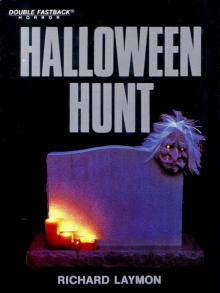 HALLOWEEN HUNT
HALLOWEEN HUNT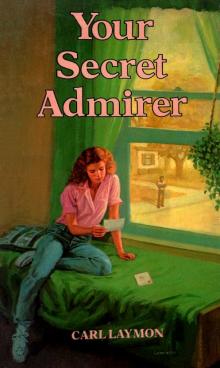 YOUR SECRET ADMIRER
YOUR SECRET ADMIRER TO WAKE THE DEAD
TO WAKE THE DEAD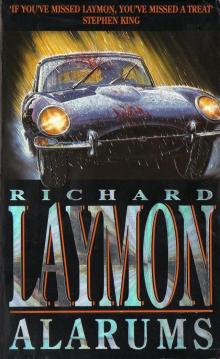 Alarums
Alarums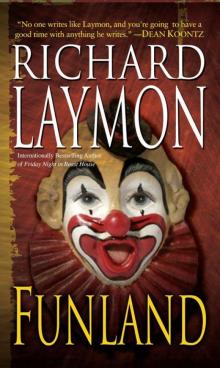 Funland
Funland Cuts
Cuts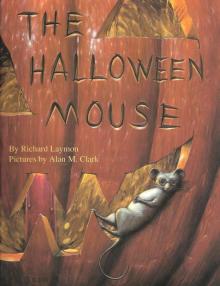 The Halloween Mouse
The Halloween Mouse The Lake
The Lake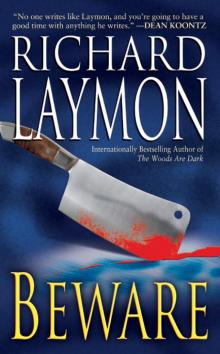 Beware
Beware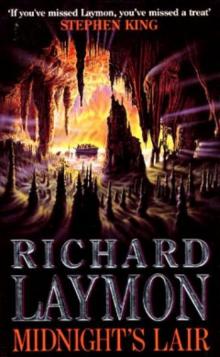 Midnight's Lair
Midnight's Lair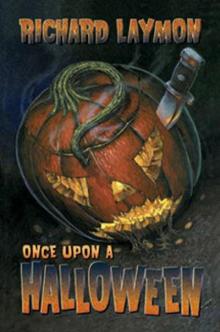 Once Upon a Halloween
Once Upon a Halloween The Glory Bus
The Glory Bus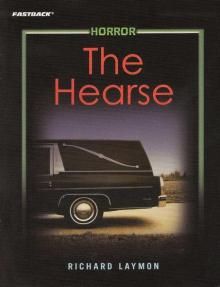 The Hearse
The Hearse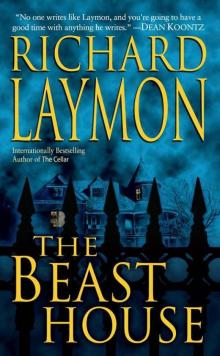 The Beast House
The Beast House Dreambox Junkies
Dreambox Junkies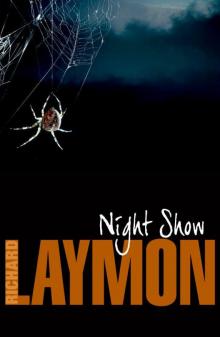 Night Show
Night Show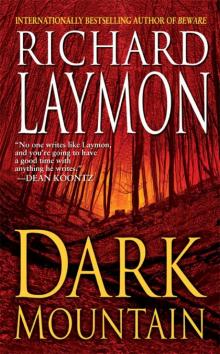 Dark Mountain
Dark Mountain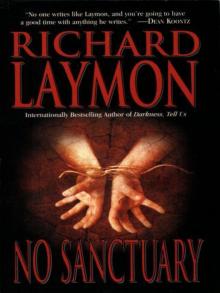 No Sanctuary
No Sanctuary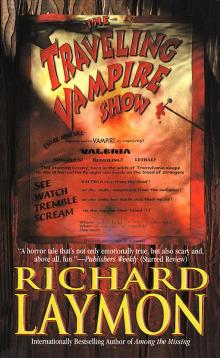 The Traveling Vampire Show
The Traveling Vampire Show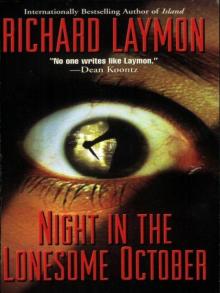 Night in the Lonesome October
Night in the Lonesome October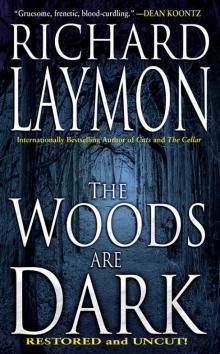 The Woods Are Dark
The Woods Are Dark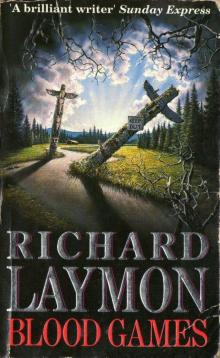 Blood Games
Blood Games Thin Air
Thin Air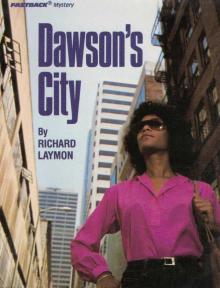 Dawson's City
Dawson's City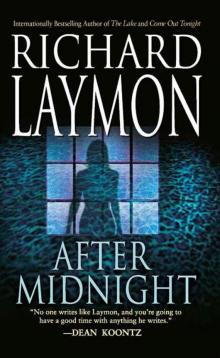 After Midnight
After Midnight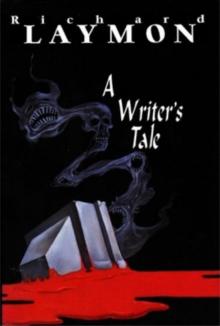 A Writer's Tale
A Writer's Tale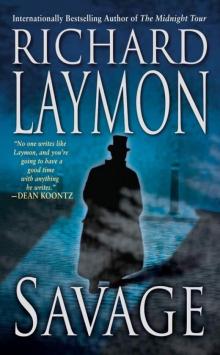 Savage
Savage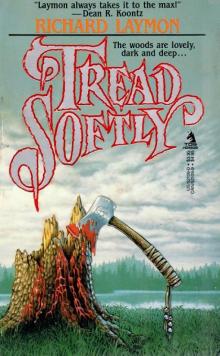 Tread Softly
Tread Softly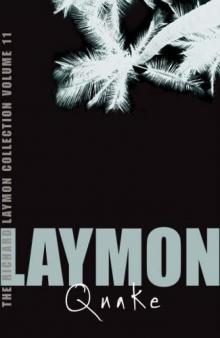 Quake
Quake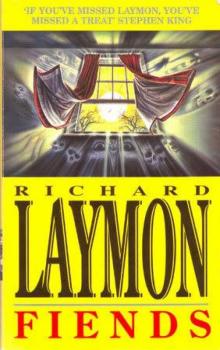 Fiends SSC
Fiends SSC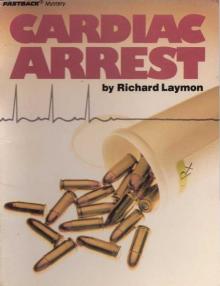 Cardiac Arrest
Cardiac Arrest Island
Island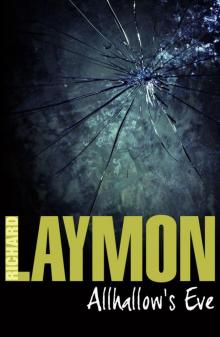 Allhallow's Eve: (Richard Laymon Horror Classic)
Allhallow's Eve: (Richard Laymon Horror Classic)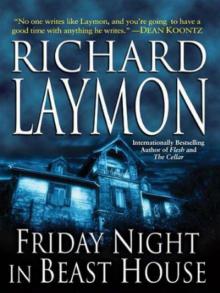 Friday Night in Beast House
Friday Night in Beast House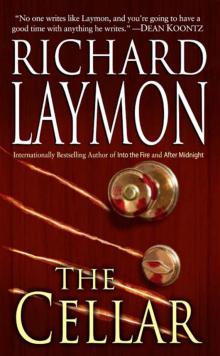 The Cellar
The Cellar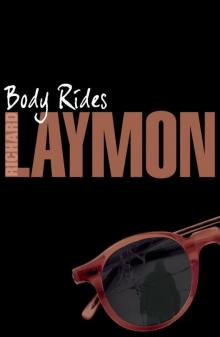 Body Rides
Body Rides The Wilds
The Wilds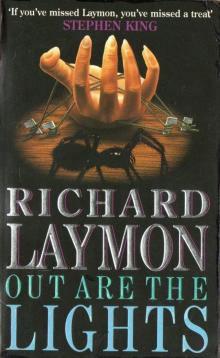 Out Are the Lights
Out Are the Lights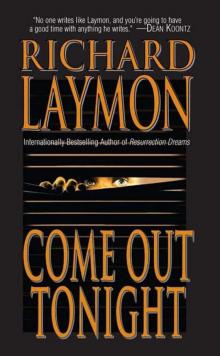 Come Out Tonight
Come Out Tonight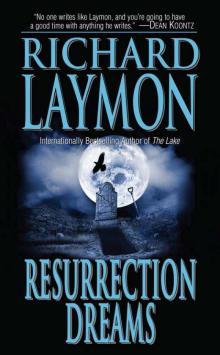 Resurrection Dreams
Resurrection Dreams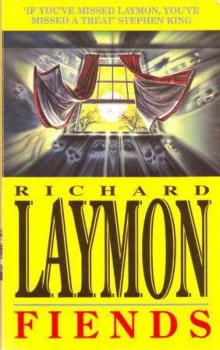 Fiends
Fiends The Cellar bhc-1
The Cellar bhc-1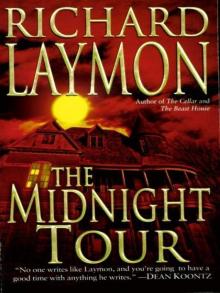 The Midnight Tour
The Midnight Tour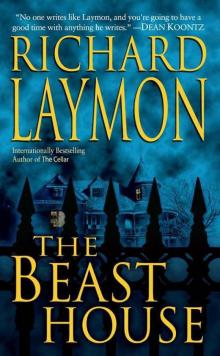 The Beast House bhc-2
The Beast House bhc-2 Endless Night
Endless Night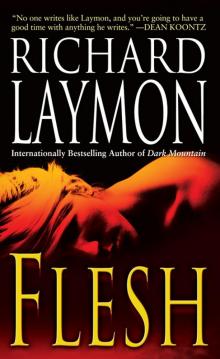 Flesh
Flesh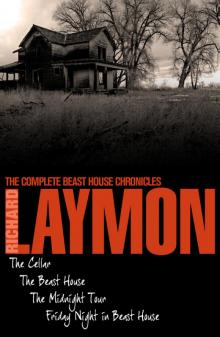 The Complete Beast House Chronicles
The Complete Beast House Chronicles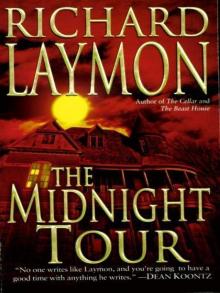 The Midnight Tour bhc-3
The Midnight Tour bhc-3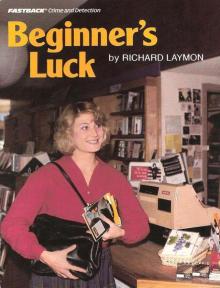 Beginner's Luck
Beginner's Luck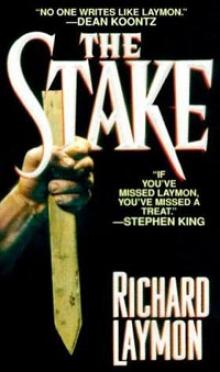 The Stake
The Stake